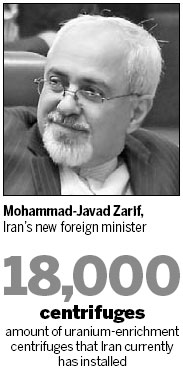Iran signals willingness to resume nuclear talks
Updated: 2013-08-19 08:07
(China Daily/Agencies)
|
|||||||||||
Foreign minister expresses 'political determination' to resolve all issues
Iran's new Foreign Minister Mohammad-Javad Zarif said that his country is ready for "purposeful" nuclear talks within a specified timetable, local media reported on Sunday.
Zarif made the remarks in a telephone conversation with European Union foreign policy chief Catherine Ashton on Saturday.
The minister stressed a "political determination" and "serious will" for resolving Iran's nuclear issue that would recognize Iran's nuclear rights, the report said.
Ashton, for her part, congratulated Zarif on his new post, expressing hope that the talks between the Islamic republic and six world powers known as P5+1 will resume "as soon as possible".
Hopes have been running high in the international community that Iran will resolve its nuclear standoff with the West since Hassan Rouhani won the Iranian presidential election on June 14.
Rouhani said after his election that Iran will try to be more "transparent" on the nuclear issue, but added that his administration will not negotiate over the country's rights to use "peaceful" nuclear technology.
Both Iran and the world powers have shown an interest in resuming nuclear talks after the last round of negotiations, which were held in Almaty, Kazakhstan, in April without yielding any practical results.
In a separate development, Iran has installed 18,000 uranium-enrichment centrifuges, the country's outgoing nuclear chief was quoted as saying by Iranian media on Saturday.
The US and its Western allies are pressing Iran to curb its uranium enrichment program, which they suspect is aimed at developing a nuclear weapon, but Iran refuses and says its nuclear activity is for purely peaceful purposes.

President Rouhani, a former nuclear negotiator who oversaw a previous deal to suspend Iran's uranium enrichment, has welcomed new talks with world powers over the program but has insisted on Iran's right to enrich uranium.
Iran has 17,000 older first-generation IR-1 centrifuges, of which 10,000 are operating and 7,000 are ready to begin working, the ISNA news agency quoted Fereydoun Abbasi-Davani, outgoing head of the Atomic Energy Organization of Iran, as saying.
In May, a report from the UN nuclear watchdog indicated that Iran had installed about 16,600 IR-1 machines in two separate facilities.
Abbasi-Davani also said there were 1,000 new, more-advanced centrifuges ready to start operations, in a reference to IR-2m centrifuges, which would allow Iran to enrich uranium several times faster than the IR-1 machines.
The IAEA said in its last report in May that Iran had installed 689 such centrifuges and empty centrifuge casings.
On Friday, Rouhani appointed Ali Akbar Salehi, Iran's previous foreign minister, to take over the AEOI. Salehi, who once headed the agency, is seen as a pragmatist, as opposed to the more hard-line Abbasi-Davani.
Xinhua-Reuters
Related Stories
Iran nuclear talks still in stalemate 2013-04-08 09:05
China says Iran nuclear talks 'candid, constructive' 2013-02-27 17:00
China expects progress in Iran nuclear talks 2013-02-26 17:33
Britain should take action to improve ties: Iran 2013-08-05 20:14
Iran beats host to win third Asian Champion title 2013-08-12 07:56
Iran improves to 4-0 after beating Bahrain at FIBA Asia Championship 2013-08-07 16:08
Today's Top News
Be innovative, Li tells graduates
Beijing, Moscow cooperate on floods
New info in Diana's death
Egypt: 36 prisoners killed in violence
Onus on US to improve military ties
Home price rises slow in July
Trustee council may be answer for reforming
40 killed as floods ravage NE China
Hot Topics
Lunar probe , China growth forecasts, Emission rules get tougher, China seen through 'colored lens', International board,
Editor's Picks

|

|

|

|

|

|





